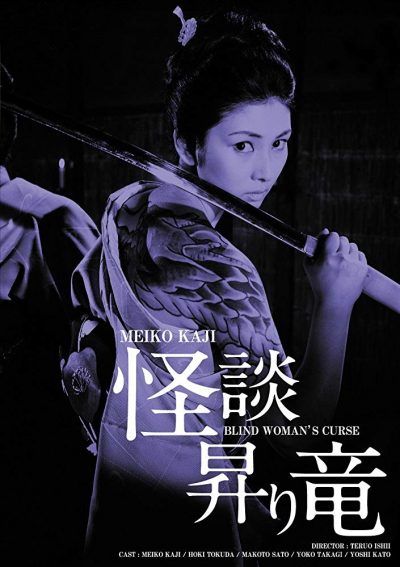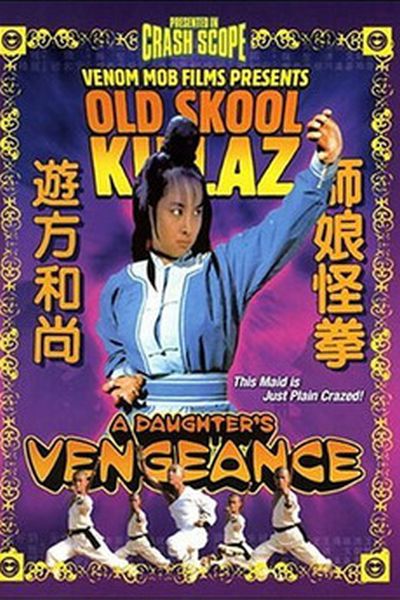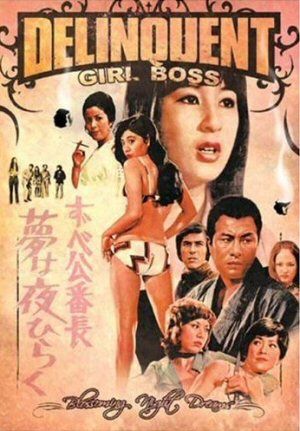★★★
“The girls with the dragon tattoo”
 Akemi Tachibana (Kaji) is second in command of her yakuza gang. During a battle with another group, she accidentally blinds Aiko Gouda (Tokuda), the sister of an enemy – an incident Akemi believes leaves her cursed, after a black cat laps up the blood spilled as a result. Following three years in jail, she returns to find the clan on the verge of war against their rivals, the Dobashi group. Various members of the Tachibanas are turning up dead, and with their tattoos flayed off. Turns out that Gouda has joined the Dobashi gang, with the aim of extracting vengeance on the woman who took her sight, even though Akemi has borne the guilt of that event ever since.
Akemi Tachibana (Kaji) is second in command of her yakuza gang. During a battle with another group, she accidentally blinds Aiko Gouda (Tokuda), the sister of an enemy – an incident Akemi believes leaves her cursed, after a black cat laps up the blood spilled as a result. Following three years in jail, she returns to find the clan on the verge of war against their rivals, the Dobashi group. Various members of the Tachibanas are turning up dead, and with their tattoos flayed off. Turns out that Gouda has joined the Dobashi gang, with the aim of extracting vengeance on the woman who took her sight, even though Akemi has borne the guilt of that event ever since.
When it concentrates on their relationship, the film is really good, with both actresses commanding the screen with an impressive presence. This leads to a final confrontation which certainly feels like it may have been an influence on the one at the end of Kill Bill, Volume One, between the Bride and O-Ren. What’s particularly outstanding is the surprising way in which it is resolved: based on everything you’ve seen to that point, you’d be forgiven for betting, odds-on, that there will be an oce-lot of arterial spray. There isn’t – though I’ll say not much more than that. It’s a strangely effective moment, like a Western where the two gunslingers eventually face off at high noon… and decide to go for a pint instead.
What’s considerably less effective is the stuff around the edges, much of which is silly – or, perhaps, played a great deal better on the page than the screen. For example, Akemi’s female minions each have part of a dragon tattooed on their back, so when they expose their shoulders and line up, it forms the entire thing. Which sounds really cool, but ends up looking more like a samurai version of the Human Centipede. There’s also the member of the enemy clan who goes around wearing a scarlet loin-cloth. It’s difficult to take someone as a threat, when they’ve apparently forgotten to put their pants on. In its defense, this is apparently played for comedy purposes, because he smells. Yeah. About that…
This illustrates the film’s main weakness, an apparent desire to be all things to all viewers. I’m not if the audience in 1970’s Japan was crying out for comedy-horror-yakuza-swordplay films, because that’s what they get here, and the various elements vary too much in quality and fail to mesh together at all. When it concentrates on what it does well – and that’s the relationship between the two female leads – it’s very good. You can easily see why Kaji, making her debut under that name here, would go on to stardom. Given how effectively they play off each other, it’s something of a surprise Tokuda didn’t follow suit, though she did go on to become (briefly) the last of writer Henry Miller’s five wives.
Dir: Teruo Ishii
Star: Meiko Kaji, Hoki Tokuda, Makoto Sako, Hideo Sunazuka





 Look, I tried. I really did. When I found my attention had drifted away from watching the film, in good faith, I rewound the film to the point where I’d lost interest, and took up the movie again the following day. After all, maybe it was me. But when I still could barely bring myself to finish this leaden lump of poorly-crafted revenge-fu… No, having gone above and beyond the required effort, it’s really not me. This is lacklustre stuff, to put it mildly, even by the generally low standards of Taiwan.
Look, I tried. I really did. When I found my attention had drifted away from watching the film, in good faith, I rewound the film to the point where I’d lost interest, and took up the movie again the following day. After all, maybe it was me. But when I still could barely bring myself to finish this leaden lump of poorly-crafted revenge-fu… No, having gone above and beyond the required effort, it’s really not me. This is lacklustre stuff, to put it mildly, even by the generally low standards of Taiwan. This grindhouse obscurity manages to rise above the limitations of its budget, and proves an effectively nasty piece of work. The titular teenage “heroine” (Carpenter) is on the way to see her older lover, but embarks as well on a killing spree that first includes a classmate and the guy who picks them up, then a householder (Michael Findlay) whose swimming pool Janie hijacks, before moving onto a predatory lesbian and finally her lover’s girlfriend (Roberta Findlay), whom she strangles with a belt. This is all told in flashback as she tells the story to her disbelieving bedmate – though the corpse he discovers in the bath-tub rapidly changes his mind. Oh, and did I forget to mention, for extra sleaze points, he is also Janie’s daddy? Damn. All of her exploits are accompanied by narration from what could be seen as an ancestor of Dexter’s “dark passenger”, exhorting Janie to further murderous acts, in a placid and matter-of-fact tone that is actually all the more chilling for its calmness.
This grindhouse obscurity manages to rise above the limitations of its budget, and proves an effectively nasty piece of work. The titular teenage “heroine” (Carpenter) is on the way to see her older lover, but embarks as well on a killing spree that first includes a classmate and the guy who picks them up, then a householder (Michael Findlay) whose swimming pool Janie hijacks, before moving onto a predatory lesbian and finally her lover’s girlfriend (Roberta Findlay), whom she strangles with a belt. This is all told in flashback as she tells the story to her disbelieving bedmate – though the corpse he discovers in the bath-tub rapidly changes his mind. Oh, and did I forget to mention, for extra sleaze points, he is also Janie’s daddy? Damn. All of her exploits are accompanied by narration from what could be seen as an ancestor of Dexter’s “dark passenger”, exhorting Janie to further murderous acts, in a placid and matter-of-fact tone that is actually all the more chilling for its calmness. This German 1970’s film is well ahead of its time in some ways, but is postively Neanderthal in others, being basically a scream of fear about women’s liberation. It feels like a far-less subtle version of Neil LaBute’s re-make of The Wicker Man, taking place in a matriarchal town, where women are in charge, with the exception of a couple of incompetent men, to lift heavy things and provide a facade of normality (the police commissioner is an alcoholic, who knows little and cares less about what’s going on). Into this scenario comes Eve (Glas), a stressed-out secretary who has been booked in for a six-week course of treatment at the local spa. It’s not long before she stumbles across the body of a man with a knife embedded in his back, only to discover that no-one believes her, with the clinic’s doctor telling people Eve is suffering from post-tramautic hallicinations. Is that the case, or is there something genuinely unpleasant going on? And what’s this on the dinner menu?
This German 1970’s film is well ahead of its time in some ways, but is postively Neanderthal in others, being basically a scream of fear about women’s liberation. It feels like a far-less subtle version of Neil LaBute’s re-make of The Wicker Man, taking place in a matriarchal town, where women are in charge, with the exception of a couple of incompetent men, to lift heavy things and provide a facade of normality (the police commissioner is an alcoholic, who knows little and cares less about what’s going on). Into this scenario comes Eve (Glas), a stressed-out secretary who has been booked in for a six-week course of treatment at the local spa. It’s not long before she stumbles across the body of a man with a knife embedded in his back, only to discover that no-one believes her, with the clinic’s doctor telling people Eve is suffering from post-tramautic hallicinations. Is that the case, or is there something genuinely unpleasant going on? And what’s this on the dinner menu? This was my first true vintage “pinky violence” movie, though I had bumped against some fringe entries in the genre before e.g. Female Convict Scorpion: Jailhouse 41, which I enjoyed and really must get round to reviewing for here some time. This one…not so much. It focuses on Rika (Oshida), who gets out of reform school, and gets a job as a ‘companion’ at a bar, where most of the girls have a similarly troubled background. The local Yakuza boss is sniffing around, and his path crosses Rika’s after she (semi-unwittingly) helps a colleague steal some drugs from them. As a result, the house mother/bar owner, is on the hook for three million yen, plus interest.
This was my first true vintage “pinky violence” movie, though I had bumped against some fringe entries in the genre before e.g. Female Convict Scorpion: Jailhouse 41, which I enjoyed and really must get round to reviewing for here some time. This one…not so much. It focuses on Rika (Oshida), who gets out of reform school, and gets a job as a ‘companion’ at a bar, where most of the girls have a similarly troubled background. The local Yakuza boss is sniffing around, and his path crosses Rika’s after she (semi-unwittingly) helps a colleague steal some drugs from them. As a result, the house mother/bar owner, is on the hook for three million yen, plus interest.